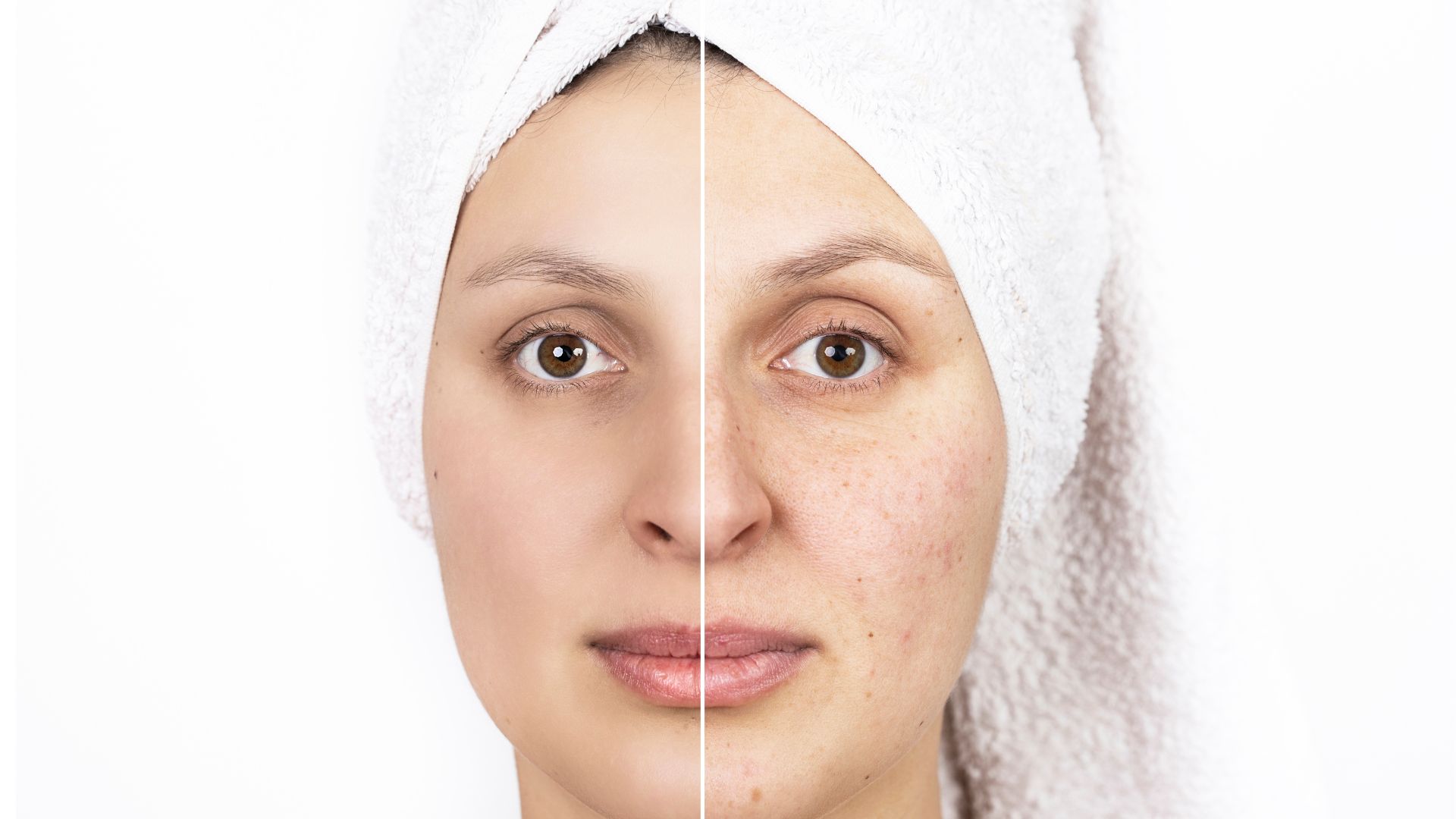What is Dermatitis?
Dermatitis, also known as eczema, is a common skin condition that causes inflammation and irritation. It can occur in people of all ages and can affect different parts of the body. The exact cause of dermatitis is often unknown, but it is believed to be a combination of genetic factors, environmental factors, and an overactive immune system.
There are several types of dermatitis, including atopic dermatitis, contact dermatitis, and seborrheic dermatitis. Atopic dermatitis is more prevalent in children and typically presents as red and itchy patches on the skin. Contact dermatitis is caused by coming into contact with irritants or allergens, such as certain fabrics or chemicals, and often results in a rash or blisters. Seborrheic dermatitis primarily affects areas of the skin that are oily, such as the scalp, face, and ears, and can cause redness, itching, and flaking.
Unfortunately, there is no cure for dermatitis, but there are treatments available to manage the symptoms and minimize flare-ups. The main goal of treatment is to relieve itching and inflammation, promote healing of the skin, and prevent infection. Treatment options may include topical corticosteroids, moisturizers, antihistamines, and avoiding triggers that may worsen symptoms.
Managing dermatitis also involves maintaining a regular skincare routine that includes gentle cleansing and moisturizing. It is important to choose mild, fragrance-free products that are suitable for sensitive skin. In some cases, identifying and avoiding specific triggers, such as certain foods or environmental factors, may be necessary to prevent flare-ups.
It is important to consult a healthcare professional, such as a dermatologist, if you suspect you have dermatitis or if your symptoms worsen. A dermatologist can evaluate your skin, provide an accurate diagnosis, and recommend appropriate treatment options. They can also offer advice on how to properly care for your skin to minimize the impact of dermatitis on your daily life.
What causes Dermatitis?
As a medical professional, I can tell you that dermatitis is a common condition that affects the skin, causing redness, itching, and irritation. There are several factors that can contribute to the development of dermatitis, and it’s important to understand these causes in order to effectively manage and treat the condition.
One of the main causes of dermatitis is an allergic reaction to certain substances. This type of dermatitis, known as allergic contact dermatitis, occurs when the skin comes into contact with an irritant or allergen, such as certain chemicals, metals, or plants. Common allergens include nickel (found in jewelry), fragrances, cosmetics, and latex. When the skin is exposed to these substances, it can trigger an immune response, leading to the development of dermatitis.
Another common cause of dermatitis is irritant contact dermatitis, which occurs when the skin is repeatedly exposed to irritants such as soaps, detergents, solvents, or even water. Unlike allergic contact dermatitis, this type of dermatitis does not involve an immune response. Instead, the irritants directly damage the skin, leading to inflammation and irritation.
Eczema, also known as atopic dermatitis, is another main cause of dermatitis. This chronic condition is believed to be a result of both genetic and environmental factors. People with eczema have a hypersensitive immune system, which can lead to an overreaction to certain triggers, such as allergens, irritants, or even stress. Eczema often runs in families and is more common in individuals with a history of allergies or asthma.
Other causes of dermatitis include fungal infections, such as ringworm or athlete’s foot, which can cause red, itchy, and inflamed skin. Additionally, certain systemic conditions, such as psoriasis or autoimmune disorders, can also lead to dermatitis. In some cases, dermatitis can be triggered or worsened by environmental factors, such as cold weather, heat and humidity, or exposure to excessive moisture.
Overall, it’s important to identify the underlying cause of dermatitis in order to effectively manage and treat the condition. This can involve avoiding certain triggers, using topical creams or medications to reduce inflammation, or taking steps to improve overall skin health. If you’re experiencing symptoms of dermatitis, it’s always best to consult with a medical professional who can provide a proper diagnosis and recommend an appropriate treatment plan.
What precautions you should take for Dermatitis?
As a medical professional, it is important to understand the precautions one must take with dermatitis to prevent exacerbation and manage the condition effectively. Dermatitis is a skin condition characterized by inflammation and irritation, and it can be triggered by a variety of factors, such as allergens, irritants, and even certain medical conditions. Here are some precautions that individuals with dermatitis should consider:
Avoid irritants: It is crucial to identify and avoid substances that may irritate the skin. Common irritants include soaps, detergents, fragrances, and certain fabrics. Opt for gentle, hypoallergenic products that are free from dyes and perfumes.
Moisturize regularly: Moisturizing the skin is essential for individuals with dermatitis. Use emollients or moisturizers specifically formulated for sensitive skin to keep the skin hydrated and prevent dryness, which can trigger flare-ups.
Protect your skin: When engaging in activities that may expose the skin to potential irritants or allergens, such as gardening or cleaning, always wear protective gloves and clothing to create a barrier between your skin and potential triggers.
Practice good hygiene: Keep your skin clean, but be mindful of not over-washing or using overly harsh cleansers. Avoid hot water as it can strip away the skin’s natural oils and worsen symptoms. Instead, opt for lukewarm water and mild, fragrance-free cleansers.
Identify and avoid allergens: Allergens can vary from person to person. Keep a diary of potential triggers and try to identify patterns. Common allergens include pollen, pet dander, certain foods, and mold. Limit your exposure to these substances as much as possible.
Manage stress: Stress is known to worsen dermatitis symptoms. Implement stress-management techniques such as exercise, meditation, deep breathing, and engaging in hobbies to help reduce stress levels and minimize flare-ups.
Seek medical advice: If you are experiencing persistent or severe dermatitis symptoms despite taking precautions, it is essential to seek medical advice. A dermatologist can help formulate an individualized treatment plan and provide guidance on managing your specific type of dermatitis.
What are the main symptoms of Dermatitis?
Dermatitis, also known as eczema, is a common skin condition that can cause redness, itching, and discomfort. The symptoms of dermatitis can vary from person to person and may change over time. However, there are some main symptoms that are commonly seen in individuals with dermatitis.
One of the most common symptoms of dermatitis is a rash. This rash can appear as small red bumps, raised patches of skin, or dry, scaly patches. The rash may be itchy and may become more aggravated with scratching. In some cases, the rash may ooze or develop blisters.
Another common symptom of dermatitis is itching. Itching can range from mild to severe and may be worse at night. The itching can be so intense that it disrupts sleep and affects daily activities. Scratching the affected areas can lead to further irritation and can potentially cause the skin to become thickened or lichenified.
In addition to the rash and itching, dermatitis can also cause dryness and flaking of the skin. The affected skin may become rough, cracked, or scaly. This dryness can make the skin more prone to cracking, which increases the risk of infection.
Some individuals with dermatitis may also experience swelling or inflammation of the affected areas. This can make the skin appear red and puffy. In severe cases, the skin may become painful and tender to the touch.
In summary, the main symptoms of dermatitis include a rash, itching, dryness and flaking of the skin, and swelling or inflammation. If you are experiencing any of these symptoms, it is recommended to consult a healthcare professional for a proper diagnosis and appropriate treatment.
How Dermatitis is diagnosed?
Dermatitis is a common skin condition that can cause itchiness, redness, and inflammation. Diagnosing dermatitis begins with a thorough medical history and physical examination by a dermatologist or other healthcare provider with experience in skin disorders. The healthcare provider will ask you questions about your symptoms, such as when they started, what makes them better or worse, and if you have had similar episodes in the past. They will also inquire about any known triggers, such as exposure to certain substances or allergens.
During the physical examination, the healthcare provider will carefully examine your skin for any characteristic signs of dermatitis, such as redness, swelling, and scaling. They may also ask about your family history of skin conditions or allergies, as these can be relevant factors in diagnosing dermatitis. In some cases, additional tests may be necessary to confirm the diagnosis. These can include patch testing, where small amounts of potential allergens are applied to the skin to see if they trigger a reaction; skin biopsy, where a small sample of skin is collected for analysis under a microscope; or blood tests to check for specific antibodies or other markers of inflammation.
Overall, the diagnosis of dermatitis is generally made based on the combination of your medical history, physical examination, and sometimes, additional tests. It’s important to work closely with your healthcare provider to ensure an accurate diagnosis and appropriate treatment plan for your specific type of dermatitis.
What are some of the main medical treatments for Dermatitis?
Dermatitis is a common skin condition that often leads to red, itchy, and inflamed skin. There are several main medical treatments that can help alleviate the symptoms and manage the condition. Topical corticosteroids are commonly prescribed to reduce inflammation and itching. These drugs work by suppressing the immune response and can come in the form of creams, ointments, or lotions. In more severe cases, oral corticosteroids may be prescribed.
Other treatments commonly used include calcineurin inhibitors, which help suppress the immune response, and antihistamines, which can reduce itching. Additionally, moisturizers are often recommended to help keep the skin hydrated and prevent further irritation. It’s important to consult a medical professional to determine the most suitable treatment plan based on the severity and type of dermatitis.
Which supplements work best with Dermatitis?
While there is no definitive cure for dermatitis, certain supplements have been found to help manage the symptoms and support overall skin health.
One supplement that has shown promising results is omega-3 fatty acids. These essential fatty acids are found in oily fish, nuts, and seeds. Research suggests that omega-3 supplements can help reduce inflammation in the body, including the skin, which may provide relief for those with dermatitis. It’s important to note that omega-3 supplements may take several weeks to start showing noticeable improvements, so patience is key.
Vitamin D is another supplement that may be beneficial for individuals with dermatitis. Vitamin D plays a crucial role in skin health, and deficiency has been linked to various skin conditions, including psoriasis and eczema. Some studies suggest that vitamin D supplements can help alleviate symptoms of dermatitis, although more research is needed to confirm these findings. Remember to consult with a healthcare professional to determine the appropriate dosage of vitamin D for your specific needs.
Probiotics, often referred to as “good bacteria,” have also shown potential in managing dermatitis symptoms. These supplements help restore and maintain a healthy balance of gut bacteria, which can in turn improve immune function and reduce inflammation. While research in this area is still limited, some studies indicate that probiotics may help reduce the severity and duration of dermatitis flare-ups.
It’s important to remember that supplements should not replace medical treatment or prescribed medications for dermatitis. However, incorporating these supplements into your daily routine may complement your treatment plan and provide additional support for managing the symptoms of dermatitis. As always, consult with a healthcare professional before starting any new supplement regimen, as they can provide personalized advice based on your specific needs and medical history.
Frequently Asked Question on Dermatitis
1. What is dermatitis?
Dermatitis, also known as eczema, is a common skin condition that causes inflammation and irritation. It can result in red, itchy, and swollen skin, often accompanied by a rash. Dermatitis can occur due to various factors, including allergies, irritants, genetic predisposition, or an overactive immune system response. It can appear on any part of the body and may differ in severity and appearance from person to person.
2. What are the different types of dermatitis?
There are several types of dermatitis, including atopic dermatitis (eczema), contact dermatitis, seborrheic dermatitis, and nummular dermatitis. Atopic dermatitis is a chronic condition that often begins in infancy and is associated with a family history of allergies or asthma. Contact dermatitis occurs when the skin comes into contact with an irritant or allergen. Seborrheic dermatitis is characterized by greasy or oily scales on the scalp or other areas with high sebum production. Nummular dermatitis presents as coin-shaped patches of irritated skin.
3. What are the common symptoms of dermatitis?
The symptoms of dermatitis can vary depending on the type and severity of the condition. However, common symptoms include redness, itching, dryness, swelling, flaking, blistering, and oozing of the affected skin. In some cases, dermatitis can also lead to pain or a burning sensation. The symptoms may worsen with exposure to triggers such as certain fabrics, soaps, cosmetics, or environmental factors.
4. How is dermatitis diagnosed?
Diagnosing dermatitis usually involves a physical examination of the affected skin and a detailed medical history. Your dermatologist may also ask questions about your lifestyle, job, and any known allergies or irritants that might trigger the condition. In some cases, additional tests such as skin patch testing, blood tests, or skin biopsy might be recommended to determine the specific cause or type of dermatitis.
5. Is dermatitis contagious?
No, dermatitis is not contagious. It is a non-infectious condition that occurs due to various factors such as genetics, allergens, or irritants. You cannot catch dermatitis from someone else or transmit it to others through physical contact.
6. Can dermatitis be cured?
While dermatitis cannot be completely cured, it can be effectively managed to reduce symptoms and prevent flare-ups. Treatment options vary depending on the type and severity of dermatitis but often include a combination of topical creams or ointments, moisturizers, antihistamines, or corticosteroids. In severe cases, systemic medications or phototherapy might be recommended. It is essential to work closely with a dermatologist to develop a personalized treatment plan and maintain regular skincare practices to minimize symptoms and maintain skin health.
7. Are there any home remedies or natural treatments for dermatitis?
Although there is no one-size-fits-all approach to treating dermatitis, some home remedies and natural treatments might help alleviate symptoms and support the healing process. These can include applying cold compresses to reduce itchiness and inflammation, using mild, fragrance-free soaps and moisturizers, avoiding known triggers or irritants, maintaining good skincare practices, and keeping the skin hydrated. However, it is crucial to consult with a medical professional before trying any home remedies, especially if the symptoms persist or worsen.
8. Can diet affect dermatitis?
The role of diet in dermatitis is an area of ongoing research. For some individuals, certain foods might act as triggers for dermatitis flare-ups. Common food triggers include dairy products, eggs, nuts, soy, and gluten. To identify potential dietary triggers, individuals may undergo an elimination diet under the guidance of a healthcare professional or allergist. It is essential to note that diet alone may not completely resolve dermatitis, and a comprehensive treatment plan that addresses all potential triggers is necessary.
9. Can stress worsen dermatitis?
Stress can indeed worsen dermatitis symptoms. Emotional stress or anxiety can trigger or exacerbate flare-ups in individuals with dermatitis. The exact mechanisms are not fully understood; however, stress is believed to affect the immune system and disrupt the skin barrier function. Engaging in stress-management techniques such as regular exercise, meditation, and seeking emotional support can help minimize stress levels and potentially reduce the frequency and severity of dermatitis symptoms.
10. How can I prevent dermatitis flare-ups?
Preventing dermatitis flare-ups involves adopting a proactive approach to managing triggers and maintaining good skincare practices. Some tips to prevent flare-ups include identifying and avoiding known allergens or irritants, using mild, fragrance-free skincare products, moisturizing regularly to keep the skin hydrated, avoiding excessive heat or cold exposure, minimizing stress levels, and practicing good hand hygiene. It is important to develop an individualized plan with the guidance of a dermatologist to effectively manage and prevent flare-ups.
Understand the who, what & why behind your favourite products
Brand Values | Product Philosophy | Product USPs
Read brand stories, their raison-d'etre, and understand what drives them to caringly create the highest quality products for your well-being.
Brand stories
Expert reviews you can rely upon
Expert Insights | Product Reviews | Connect with Experts
Gain valuable insights and read unbiased product reviews by subject matter Experts on Zotezo, the ultimate trust commerce platform, that empowers millions globally to make informed decisions for their wellbeing.
Expert Advisory




